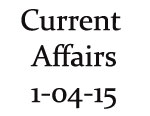-
Current Affairs 1st April 2015
Updated : 01-Apr-2015
Current Affairs 1st April 2015 - Important Points
Port Blair Magnetic Observatory established in - Port Blair, Andaman and Nicobar Islands
With how much percent did the Australia's IAG raised stake in SBI General Insurance - from 26% to 49%
Who has approved 1500 crore rupees for AP Capital construction - Union Ministry of Finance
With which country did China signed five agreements - Sri Lanka
On whom did RBI charged 5 lakh rupees fine for violation of norms - on 16 Central Co-operative Banks
Myanmar Government signed draft cease-fire agreement with - 16 Ethnic Rebel Groups
Current Affairs 1st April 2015 - Details
Port Blair Magnetic Observatory established in - Port Blair, Andaman and Nicobar Islands
Among the important National Current Affairs, On 30th March 2015, at Shoal Bay No. 8 in Port Blair, Andaman and Nicobar Islands, the Union Minister of Science and Technology and Earth Sciences Dr. Harsh Vardhan initiated Port Blair Magnetic Observatory (PBMO).
The observatory has been set up by the Indian Institute of Geomagnetism (IIG) under the Multi-Parametric Geophysical Observatories (MPGO) initiated by the Union Ministry of Science and Technology and Earth Sciences.
IIG set up network of 14 MPGO, including the PBMO, across the country to monitor seismic and co-seismic signals by using multi techniques.
With how much percent did the Australia's IAG raised stake in SBI General Insurance - from 26% to 49%
Among the important National Current Affairs, On 26th March 2015, Insurance Australia Group Ltd (IAG) announced that it will raise its stake in SBI General Insurance (SBIGI) from 26% to 49%.
In the backdrop of the Insurance Laws (Amendment) Bill, 2015, IAG decided to increase its stake in SBIGI. The bill pursues to increase foreign investment limit in local insurers to 49% from 26%
SBI General Insurance is a joint venture between the IAG of Australia and State Bank of India. It was initiated in 2010. This conclusion of IAG will lead to dilution of SBI’s 76% stake in SBI General Insurance to 51%.
Who has approved 1500 crore rupees for AP Capital construction - Union Ministry of Finance
On 30th March 2015, 1500 crore rupees to Andhra Pradesh (AP) has been allocated for the construction of necessary infrastructure in the new capital by Union Ministry of Finance. Out of the 1500 crore rupees sanctioned 1000 crore rupees are meant for essential amenities and 500 crore rupees for administrative buildings.
The Special Financial Support (SFS) is in tune with the section 94(3) of the Andhra Pradesh Reorganization Act, 2014 which mandates the Union Government to extend financial support to Andhra Pradesh to construct essential infrastructure including Raj Bhawan, High Court, Government Secretariat, Legislative Assembly and Legislative Council.
The new capital of AP is intended to be constructed in the Vijayawada-Guntur-Tenali-Mangalagiri (VGMT) area on the banks of Krishna river and is named as Amaravathi.
With which country did China signed five agreements - Sri Lanka
Among the important International Current Affairs, On 26th March 2015, to deepen development partnership between the two countries, China and Sri Lanka signed five agreements. Sri Lankan president Maithripala Sirisena signed the agreements in Beijing during the maiden visit to China after assuming the office in January 2015.
Consequences of the Sri Lankan president’s visit to China
- Both the countries restated the shared loyalty of the two countries to the Five Principles of Peaceful Co-existence or Pancha Sheela.
- Five agreements were signed related to cooperation for special aid in public health, development of water treatment methods and technologies in kidney disease affected areas, research and development of the coconut industry and refurbishment of the Superior Courts Complex in Sri Lanka.
- Third round of negotiations will be kicked start to conclude the proposed China-Sri Lanka Free Trade Agreement (FTA).
- China invited Sri Lanka to become a founding-member of the Chinese proposed Asian Infrastructure Investment Bank (AIIB).
- 2000 training opportunities for new scientists of Sri Lanka wiil be provided by China in the next five years.
- Chinese language training centres will be settled up in Sri Lanka to deepen cultural partnership between both the countries.
On whom did RBI charged 5 lakh rupees fine for violation of norms - on 16 Central Co-operative Banks
Among the important National Current Affairs, On 31st March 2015, The Reserve Bank of India (RBI) imposed a monetary penalty of five lakh rupees on 16 Central Co-operative Banks (CCBs). The penalty was imposed for inconstancy of the Anti-Money Laundering and Know Your Customer (KYC) guidelines. The banks on which the penalty was imposed are :
- The Dumka Central Co-operative Bank Ltd., Dumka (Jharkhand)
- The Gumla Simdega Central Co-operative Bank Ltd., (Jharkhand)
- The Dhanbad Central Co-operative Bank Ltd., (Jharkhand)
- The Rewari Central Co-operative Bank Ltd., Rewari (Haryana)
- The Mansa Central Co-operative Bank Ltd., Mansa (Punjab)
- The Jind Central Co-operative Bank Ltd., (Haryana)
- The Gopalganj Central Co-operative Bank Ltd., Gopalganj (Bihar)
- Ajmer Central Co-operative Bank Ltd., Ajmer (Rajasthan)
- Hanumangarh Kendriya Sahakari Bank Ltd., (Rajasthan)
- The Central Co-operative Bank Ltd., Bikaner (Rajasthan)
- The Sirohi Central Co-operative Bank Ltd., Sirohi (Rajasthan)
- The Bundi Central Co-operative Bank Ltd., Bundi (Rajasthan)
- The Boudh Co-operative Central Bank Ltd., (Odisha)
- Bhawanipatna Central Co-operative Bank, (Odisha)
- Cuttack Central Co-operative Bank Ltd., (Odisha)
- The Sambalpur District Co-operative Central Bank Ltd., (Odisha)
The penalties were charged on these co-operative banks in exercise of powers vested in RBI under the provisions of Section 47(A) read with Section 46 of the Banking Regulation Act, 1949 (As applicable to Co-operative Societies), for non-adherence to Know Your Customer (KYC) norms and Anti-Money Laundering (AML) standards.
Myanmar Government signed draft cease-fire agreement with - 16 Ethnic Rebel Groups
On 31st March 2015, a draft nationwide cease-fire agreement was signed by Myanmar Government and 16 ethnic rebel groups. The aim of the draft is to end more than 65 years of civil unrest and armed conflict in the country.
The agreement was signed between the Union Peace-making Working Committee and the Nationwide Ceasefire Coordination Team at the Myanmar Peace Centre in Yangon. Myanmar's President U Thein Sein witnessed the agreement.
The agreement was signed after seven rounds of meetings since 2013, accorded at resolving four points of dispute. These include amongst others
- Recruitment by the armed groups should come to a halt.
- Armed rebel groups’ territory and status were confirmed.
- The nature and configuration of the political dialogue.
Now the mediator from the armed rebel groups will confer with their leaders before giving final approval to the draft.
The motive behind the draft ceasefire agreement is to bring all the rebels into a process that will lead on to talks on greater devolution of power and resources which is something that has been resisted by the Myanmar government since 1948.














